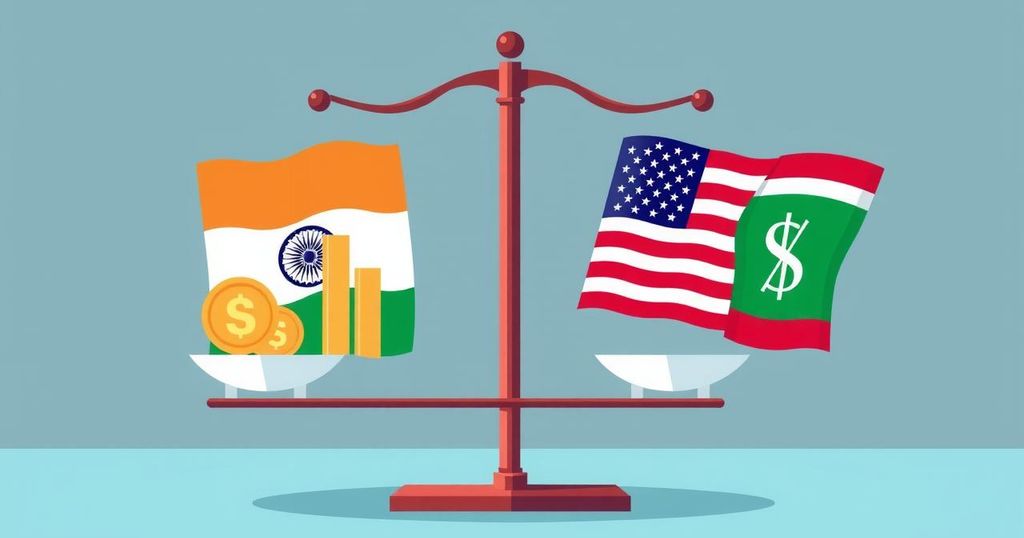Indian-American Lawmakers Decry Trump’s Reciprocal Tariffs as Damaging Policy
Indian-American lawmakers have denounced President Trump’s reciprocal tariffs on India as “reckless and self-destructive.” The tariffs, imposing a 26 percent charge, are believed to hinder competitiveness of Indian goods and impose financial burdens on American families. Prominent figures like Congressman Raja Krishnamoorthi and Ro Khanna urge a reconsideration of these policies to safeguard both nations’ economies.
Indian-American lawmakers and the diaspora community have expressed strong criticism towards President Donald Trump’s recently imposed reciprocal tariffs on India, labeling these measures as “reckless and self-destructive.” They are urging leaders from both nations to engage in constructive dialogue to tackle the economic ramifications of the tariffs.
On Wednesday, President Trump enacted a 26 percent “discounted reciprocal tariff” on India, justified by stating that “India charges us 52 percent so we will charge them half of that – 26 percent.” This directive is part of a broader initiative targeting approximately 60 countries, aiming to counteract elevated duties on American products imposed worldwide.
The implications of these tariffs were highlighted by Congressman Raja Krishnamoorthi, who remarked that they constitute a tax burden on working families while beneficially aiding the wealthiest Americans. He asserted that these tariffs render American goods less competitive, ultimately increasing financial pressure on families in times of economic uncertainty.
Congressman Ro Khanna criticized the rushed implementation of the tariffs as lacking any coherent strategy, stating, “Trump is literally trying to destroy our economy with his Liberation Day tariffs slapped overnight, no strategy, no consultation, no congressional input.” He underscored potential rises in costs for essential goods and services which could lead to economic instability, exacerbating concerns regarding possible recession or stagflation.
Dr. Ami Bera, another prominent Indian-American Congressman, emphasized that the tariffs would not lead to American prosperity, asserting that the costs would ultimately be borne by consumers. He reiterated that this move represents a tax increase rather than a reduction.
Ajay Bhutoria, a former advisor to President Biden, elaborated on the potential repercussions of the tariffs on Indian exports and noted that significant sectors like textiles and pharmaceuticals would face decreased competitiveness, placing millions of livelihoods at risk while increasing costs for American consumers.
Wendy Cutler from the Asia Society Policy Institute remarked that the tariff rates would likely shock trading partners and damage the US economy, leading to elevated consumer prices and slower economic growth. She highlighted how neighboring countries would feel the ramifications of such policies, potentially inciting them to seek counter-measures to protect their economies.
In conclusion, the reciprocal tariffs imposed by President Trump have ignited widespread criticism among Indian-American lawmakers, who argue that such measures are economically detrimental. Key voices in Congress urge for a dialogue between the US and India to mitigate the adverse impacts on consumers and maintain the strong economic partnership historically shared between the two nations. The situation calls for mindful reconsideration and collaboration to address the ensuing economic complexities.
In summary, the recent reciprocal tariffs imposed by President Trump have drawn significant disapproval from Indian-American lawmakers, who believe these measures are damaging and counterproductive. They advocate for dialogue between the US and India to alleviate the financial burden these tariffs impose on consumers and to preserve a robust economic partnership. Prompt action and collaboration are necessary to mitigate the multifaceted economic challenges arising from these tariffs.
Original Source: www.ndtv.com




Post Comment